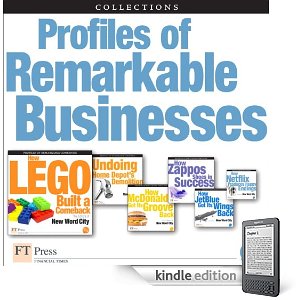Amazon had Profiles of Remarkable Businesses as a free Kindle download a few weeks ago. I have enjoyed reading about many of the individual businesses and have blogged about those books. This collections was a pretty good one because it gave insight into some familiar businesses such as: Lego, Home Depot, Zappos, McDonald’s, Ford, JetBlue, Netflix, etc. I highlighted several things as I read. I prefer reading the books individually, but there was a ton of stuff in this collection worth considering.
- The moral: Whatever the core product of your business, be it food or footstools, you can’t afford to stint on product development to keep up with changing tastes. Failing to put the necessary energy and resources into consumer research, refusing to adapt quickly—that’s the surest way to make your company and your product passé.
- Don’t react to competitors; react to customers. McDonald’s made some serious missteps when it tried to mimic its competitors and offer the likes of toasted subs and pizza. When Skinner and his colleagues tuned in to what their customers wanted (health options, extended hours), the turnaround ignited. What do you worry about more? Competitors or customers?
- Make a plan and stick with it. On its surface, the “Plan to Win” is simple, but that’s its strength. The “Five Ps” were easy for all McDonald’s employees to understand and rally around. What’s the equivalent in your organization?
- Don’t skimp on product development. Just making something doesn’t guarantee that someone will buy it.
- When you broaden your market appeal, don’t abandon your first customers.
- Be flexible. Understand local markets, and adjust your operations to local customs.
- Above all, stay tuned to your customers. The basic name of the game is adjusting to your customer’s changing wants and making them pay.
- Rebuilding shattered morale, of course, is not an overnight task.
- Ultimately, Blake wants to return morale at Home Depot to its level in the days when an orange-apron job meant truly feeling part of the company and taking pride in doing good work.
- What motivates people are deeply held values. We can’t be embarrassed talking about them and celebrating them and recognizing that we should be living them.
- He urges his managers and associates to view every-thing through the lens of the customer’s project—be it a fence, a plumbing repair, or a redesigned landscape. Viewed this way, Home Depot’s business is about advice and assistance.
- Employee morale is crucial.
- Enlist your people in your reforms.
- Concentrate on your core business.
- Focus on the project, not the product. The question is, “What does the customer need?” not “What do I want to sell?” Your role is helping the customers solve their problems, not selling commodities.
- Signal your intentions.
- How important is literal truth, both in memoir and, by extension, in our culture at large?
- Customers will forgive mistakes much more quickly than they will lies.
- To successfully navigate a crisis of trust and organizational integrity, you must know and understand, on a gut level, as Oprah did, what your brand stands for, who your audience is, and what they expect of you.
- True to Ford’s vision, the Model T created the mass market for cars. It let city dwellers explore the countryside and freed rural folk from their solitude.
- Cars changed patterns of socializing, reunited distant family members, and helped spread the new suburbs beyond the narrow corridors of commuter railroads and interurban trolleys.
- Failure is only the opportunity to begin again more intelligently.
- Creating a new business inside an existing organization is never simple.
- Reinvention calls for new and different approaches—and delivers new and different problems.
- In charting a new course, look first for an extension of your existing business.
- Beware of people who automatically reject change.
- Netflix representatives are trained to charm unhappy subscribers, using all their skills to turn potential cancellers into permanent loyalists.
- Don’t fall in love with your business model.
- Find a way to let customers tell you what they want.
- Walsh’s next goal was to persuade the whole team that everyone must contribute to the flow of ideas, taking ownership of the team and its success. In planning for games, he wanted coaches and players alike to make suggestions—and then, when the plan was made, to carry it out.
- The ultimate goal, Walsh said, was a paradox: to give the players a sense of discipline and willingness to do precisely defined jobs, but at the same time to make them creative, able to adapt, and willing to change their minds without fear of rebukes or humiliation. That, he acknowledged, is a tough balancing act.
- Can you maintain a disciplined workplace and still encourage creative thinking?
- The new compensation structure helped, but by most accounts what truly inspired business unit managers to greater achievement was the chance to run their own operations.
- In Lego’s view, there’s no getting away from marketing dependence on pop culture.
- When you’re forced to make difficult moves, make them on your own terms.
